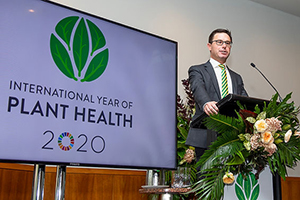Launch of IYPH in Oz
Garnering support across Australia to protect plants from pests and diseases was the aim of the launch of the International Year of Plant Health at Parliament House, Canberra on 6 February 2020 supported by the PBRI.
For the first time in history, the United Nations General Assembly has focused global attention on plant health by declaring 2020 the International Year of Plant Health (IYPH).
The year was officially launched by the Minister for Agriculture, David Littleproud, who spoke about the importance of plant health to people’s lives and the role of innovation to protect our plant production and environment.
The director general of the UN’s Food and Agriculture Organisation (FAO), Qu Dongyu, spoke via video message, acknowledged the impact of the terrible bushfires on communities and Australia’s unique biodiversity.
“2020 is a unique opportunity to increase global awareness of the important role of plant health for life on earth and to promote activities in favour of preserving and sustaining global plant genetic resources,” he said.
Government, industry and research leaders joined diplomats to Australia to mark the commencement of the year’s program of plant health events and activities being held around the nation.
The Australian chief plant protection officer, Department of Agriculture, Water and the Environment, Dr Gabrielle Vivian-Smith, said that to date, Australia’s isolation and strong biosecurity measures have helped protect its crops and the environment from many of the world’s most destructive plant pests, but the threat is growing.
Global traffic is rapidly increasing, so in the next five years the number of shipping containers arriving into Australia is predicted to rise by 75 percent. Each shipping container has the potential to carry minute, unwanted plant pathogens or pests such as the brown marmorated stink bug,” she said.
The challenge to keep Australia free from exotic pests and diseases is growing increasingly difficult and requires innovation and collaboration to manage the ever-changing biosecurity risks.
John Woods, Chair of the Council of Rural RDCs, spoke about the role of national and international collaboration championed by the members of the PBRI to leverage large investment to protect plant production systems.
“Incursions of the top 40 exotic and unwanted plant pests could cost our broadacre, horticulture and forestry industries over $32 billion – not to mention the cost to the people employed reliant on these industries, the harm to our environment and the loss of our clean, green image.”
“The current fight against agricultural pests, weeds and diseases is estimated to be already costing us more than $18 billion per year,” he said.
Executive director and CEO of Plant Health Australia, Greg Fraser, said the year presents us with a unique opportunity for innovative collaboration in plant health.
“Peak industry bodies, research and development corporations, botanic gardens, governments and the community will partner together and with the international plant health community to find new ways of combating emerging plant pest threats,” he said.
The deputy ambassador of Finland to Australia, Katja Karppinen, said Finland had been the strongest advocate of the mandating of the International Year of Plant Health by the UN.
“It is great to see the prominence that Australia is giving to the year and your priority on protecting the country from exotic plant pests and diseases through national and international collaboration,” Karppinen said.
A website has been created for the International Year of Plant Health in Australia to encourage all Australians to get involved in the year. To find about how you can help, events, stories and news about the year visit planthealthyear.org.au
If you see something unusual, report it by phoning the Exotic Plant Pest Hotline 1800 084 881.

